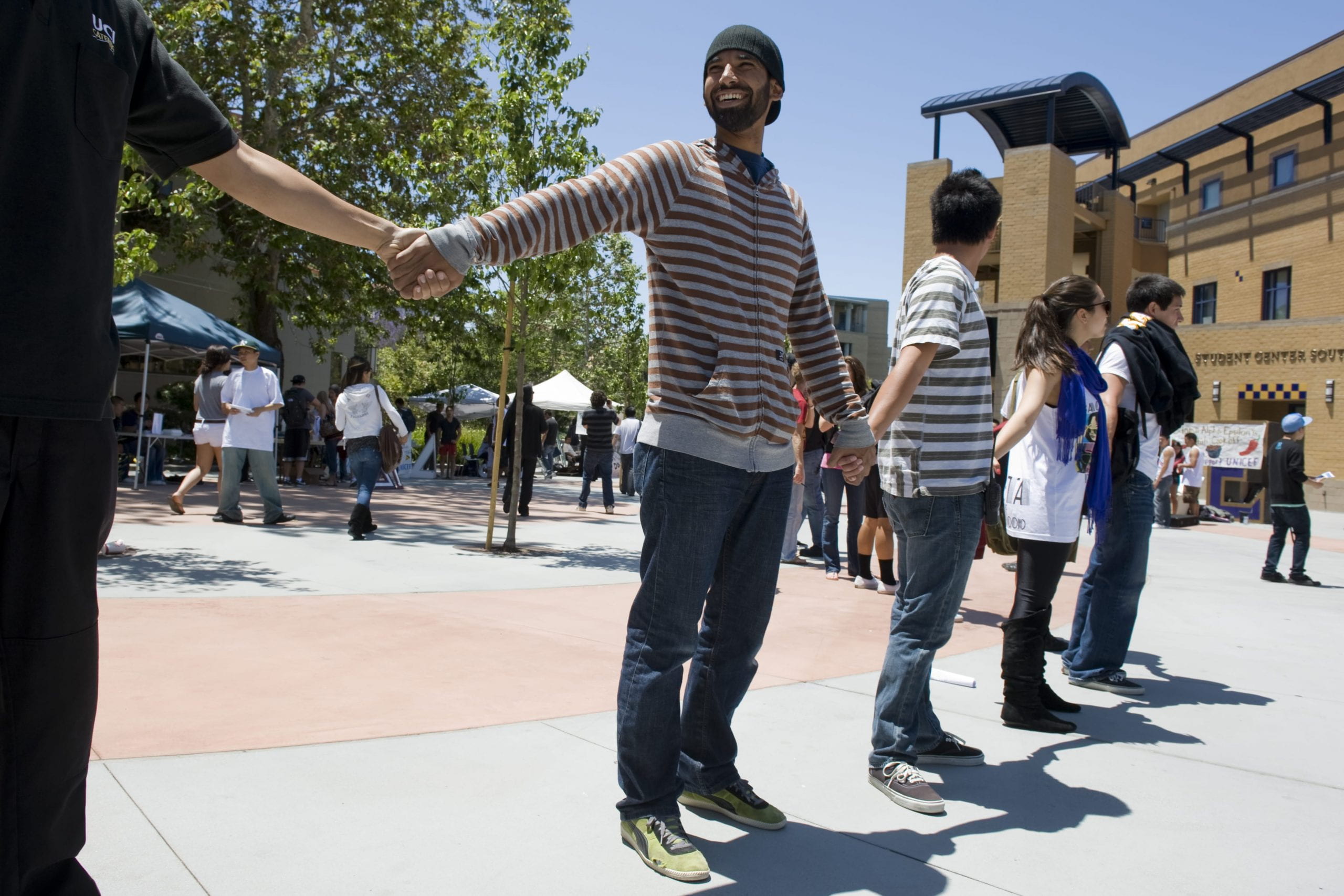
Students participate in the Hand in Hand: A Mile for Unity event on Ring Road at UC Irvine..GENERIC CAPTION: Hands around ring road..photo: Steve Zylius/University Communications
During her first year as a professor of Chicano/Latino Studies and History at UCI, Anita Casavantes Bradford published her first book, a transnational history of the Cuban Revolution.
As her career in research was beginning to take off, she decided to approach the Dean of the School of Social Sciences with an idea: to create a program bringing together faculty who were the first in their families to attend a university. Casavantes Bradford outlined a plan for faculty workshops on how to be more effective teachers and mentors to first generation students.
The following year, she was promoted to associate professor with tenure, and her fledgling mentorship program grew into a campuswide program. Now entering her fifth year at UCI, Casavantes Bradford is hard at work on her second book, a history of unaccompanied child migration to postwar United States. As for the mentorship program she launched in the Spring of 2014, the First Generation Faculty program is poised to launch systemwide, with more than nine hundred University of California faculty members from all ten state campuses signed up to participate.
Behind Casavantes Bradford’s determination to excel as both a research scholar and advocate for first generation, low income, and students of color at UCI are the memories of a difficult childhood and a prolonged struggle to access higher education.
“By the time I was 8, I had figured out we were poor,” she said. In fact, it was hard to forget, as she was reminded every month of her family’s struggles. “Hot Dog Day” was a big treat at her elementary school. She longed for the many hot dogs and other goodies that her classmates ordered each time — but knew better than to ask.
Her single mother, who alternated between minimum wage service jobs and welfare dependency as she struggled to care for her three daughters on her own, did the best she could, but there was never enough money to pay all the bills. “My mom always got a scared and had a sad look on her face when she would sit down to pencil out the calculations for one hot dog and one milk. No doughnut,” Casavantes Bradford recalls. As a result, Hot Dog Day was “always a time of anxiety and sadness.”
In third grade, Casavantes Bradford won the annual scholastic medal, awarded to the child with the best academic performance. “I had a very kind teacher who made me feel special,” she says. With support from her teacher, Casavantes Bradford began to sense her own academic potential — and she also began to hope that education might be the way out of the poverty and insecurity that defined her childhood. “If I didn’t want to be poor and afraid, I needed to be good at school,” she said.
Encouraged by the kindness of her elementary school teacher, she would become the first woman in her family to earn a high school diploma, and the first in her family to earn a college degree.
It was no easy journey.
As a community college student, Casavantes Bradford worked full time as a live-in housekeeper and nanny. As a first-generation student, she had no family members to turn to for advice on how to navigate classes, finances and extracurricular activities. She felt isolated and perpetually exhausted. When a Latin American studies professor urged her on, telling her she should go all the way to graduate school, she didn’t take him seriously. “I didn’t think people like me got to go to graduate school,” she said. But she persevered with her goal of earning her Bachelor’s degree, transferring to a prestigious four-year university and earning a BA in History and Literature and a teaching certificate.
Casavantes Bradford was a high school teacher by age 23 and spent ten years as a middle and high school teacher before making a momentous decision: she applied and was accepted as a doctoral student at UC San Diego. After completing her PhD in US, Latina/o and Latin American History in only five years, she came to UCI as a UC President’s Postdoctoral Fellow in 2011, before joining the faculty in 2013.
The rest is, indeed, history.
When asked if she sees young people in her classes that remind her of herself as an undergraduate, Casavantes Bradford replied, “Every day.” Still, when she began teaching, she noticed that first-generation students in particular weren’t taking advantage of her office hours. Knowing faculty advisers were critical to student success, she decided to make a point of telling each new class that she was a first-generation student and urged them to visit her during office hours.
There are lines outside her door every week.
Now she also arranges several First Generation Faculty lunch workshops every academic year, so that other first gen faculty can network, brainstorm together, and receive ongoing training on how to best promote academic success for the over sixty percent of UCI undergraduates who are also ‘first in the family.’ Even as she is working to complete her second book and advance her scholarly agenda, Casavantes Bradford never forgets where she came from, or how hard she had to work to get where she is today. Through the First Generation Faculty Initiative, she is bringing together faculty who have similarly overcome adversity to succeed in academia. Together, they are sharing their personal stories — daring the 40 percent of UC students who are first generation to dream of attending a university, and to believe in education as a pathway to a better life.

